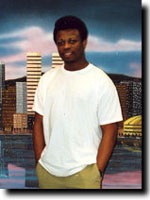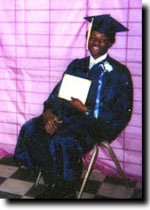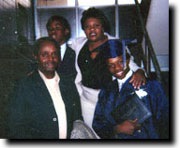2 Concurrent Life Terms -- Cocaine Conspiracy

A Mother's Plea for Justice
Gloria Driver is the mother of two sons and worked hard to provide for and raise them to become responsible adults. As a mother, she wanted to think of her children as perfect individuals, but knew they were not. "When they are wrong, I'll admit that they are wrong. When they are right, however, I'll go to my death fighting for them. I am asking for the one thing every mother wants for her child, no matter what her race-a fair chance at life. Both of my boys are now imprisoned. My oldest, Euka Wadlington, has suffered a terrible injustice.
The government's case at trial was based on the word of cooperating witnesses testifying in exchange for the promise or hope of leniency in connection with their own drug dealing. Euka Wadlington was no supplier of cocaine. No physical evidence or police surveillance connected Wadlington to any drug transaction or drug house.
According to trial transcripts, at the time of Euka's arrest in November of 1998, he was living on the south side of Chicago in a rented one-bedroom apartment with his fiancée, Latonya, her brother and her three children. Euka was working construction. Before that he worked for BFI Refuse Company as a driver, working from 6:00 am to 4:30 pm, Monday through Friday and making 650 stops a day to collect garbage. His supervisor described Euka as a "good employee."
The Reverend Jesse Beauford testified at Euka's trial. He had owned a car wash that Euka leased for a few years. The minister had an office across the street from the car wash and had opportunity to observe Euka every day washing cars. He never saw any drug activity at the car wash.



Euka's Graduation Day
Eric Palmer, a freshman at Daley College at the time of trial, worked for Euka at the car wash for over a year. Eric testified that Euka was at the car wash most of the time and helped wash cars when they were busy. He told the court that Euka was kind to employees and customers, and he did not sell drugs. He said that Euka never wore fancy clothes or jewelry. One year before Euka's trial, Eric had been shot during a dispute over a bicycle. Confined to a wheelchair, he still made the trip from Chicago to Davenport, Iowa to testify for his former employer, the one who washed cars beside him on busy days.
At sentencing, the amount of drugs attributed to Euka was based solely on the testimony of convicted or indicted persons. For example, there is George Harper who was already serving a 27-year sentence. He testified against Euka in exchange for the government's filing a motion to reduce his sentence. Harper figured Euka made about $450,000 from the cocaine that Harper sold but admitted he didn't know what Euka did with the money. He knew that Euka worked as a "garbage man" while he (George) didn't work at all.
"I took the stand at sentencing and testified that Euka worked hard at various jobs, but occasionally had to borrow money to pay the bills. I had to help pay for Euka's attorney by cashing in my pension and emptying my bank accounts. I put up my house for bond. My son owned no valuable property, and I pleaded with the Judge to look through the eyes of God for the truth."
The Judge sentenced Gloria's son, Euka Wadlington to two concurrent life terms in prison.
Near the end of his summation during Euka's trial, defense counsel Leonard C. Goodman had this to say:
Drugs are bad, there's no question about it; but the behavior of the government in this case is worse. Do you want to live in a country where the government has this kind of power to indict innocent people, to make them say what they want them to say, to destroy a citizen of this country because he won't talk and cooperate and tell lies about other people, where human beings are treated like pawns in some game, where someone lies on you so you have to lie on someone else? And what is the purpose of all this?
Are they solving the drug problem by turning all of these people against each other, making them tell stories about each other? Is it because he's so bad and so dangerous that they have to resort to these type of tactics to get him? You know that's not true. The point of all of this is for them to save face, because they've spent two years and I don't know how many thousands of dollars investigating this man. They made deals with the devil.. . .to set this man up. And then he shows up with no drugs, and he doesn't want to play their game. Well, they'll show him! That's what this is all about.
Update on the case of Euka Wadlington:
From Leonard C. Goodman (Euka's Attorney)
Since Euka's trial, four witnesses have come forward and signed affidavits supporting his claims of innocence and prosecutorial misconduct.
One of the star trial witnesses for the government told the jury that Euka supplied him with drugs, beginning when he was just fourteen years old, and also physically abused him. [The witness] now admits that this testimony was entirely fabricated and that federal agents told him he had to say these things to avoid a life sentence.
In his sworn affidavit, [the witness] explains that after his cocaine arrest in September, 1998, he gave a videotaped statement to the police naming the supplier of his drugs. Later, [the witness] was repeatedly interrogated by federal agents, including Mike Dasso, the case agent on Euka's case. Dasso told [the witness] that he needed to change his statement and name Euka as his supplier.
Agent Dasso told [the witness] that he was "on the train to getting a life sentence" and that "the only way for [him] to get off the train was to tell them something about Euka." Even more troubling, Dasso told [the witness] exactly what to say. [The witness] states in his affidavit:
"They said they knew that Euka had supplied me with drugs and that he beat me and abused me. Agent Dasso said that if I wanted to avoid a life sentence, I would have to tell him about those things. Eventually I agreed to say that Euka supplied me with drugs and physically abused me." The affidavits of [the four witnesses] were attached to a petition for habeas corpus relief filed with the trial judge, the Honorable Charles R. Wolle in November 2002. The case is fully briefed and Judge Wolle has taken it under advisement.
